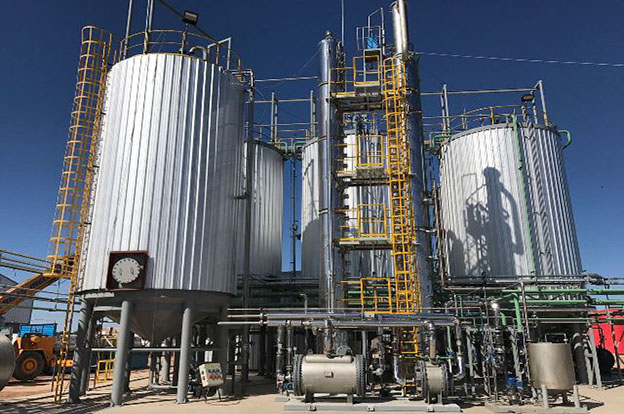- Argentina’s biofuels help reduce fossil fuel use by leveraging local crops like soy and corn.
- Policy shifts, trade barriers, and tech gaps challenge the growth of sustainable biofuel production.
- With stable laws and innovation, Argentina can lead in clean fuels and energy independence globally.
Argentina’s government recently raised the price of biofuels for the domestic market. The new set price for biofuels is 1,192 pesos ($1,111.37) per metric ton. Biofuel is mostly derived from soybeans and bioethanol from sugarcane and corn. Argentina’s biofuel is powering the future, creating new economic and environmental impacts. It is in a position to lead in biodiesel and bioethanol production to fuel both domestic demand and global markets. Biofuels contribute to reducing carbon emissions in the transport sector, support compliance with international climate targets, and reduce dependence on fossil fuel imports. Argentina’s biofuels connect agricultural surplus with the energy economy. They also provide a value-added outlet for crops to boost rural economies and agro-industrial hubs. Biofuels offer a bridge fuel for cleaner transportation, a way to monetize agricultural capacity, and a contributor to energy security and economic resilience.
Achieving these needs stable energy policies, incentives for research and development, and balanced food-energy-environment priorities. Biofuels and bioethanol are produced in over 50 plants across Argentina. The facilities supply domestic fuel blending mandates and international markets. Despite being known as a clean energy, environmentalists argue that large-scale soybean farming contributes to deforestation. Additionally, there is growing pressure on the industry to adopt more sustainable practices. This then raises questions such as, can biofuels reduce Argentina’s dependence on fossil fuels, or do they create new challenges? This article explores Argentina’s biofuel industry, its impacts, and its challenges in the energy sector.
Impacts of biofuel production in Argentina’s energy sector
Argentina’s energy landscape has been through significant transformation with biofuels emerging as a crucial component. Biofuel production is crucial to diversifying energy sources, reducing greenhouse gas emissions, and expanding rural development. Argentina’s biofuel industry, however, faces environmental, policy, and technological challenges. Here are the impacts of biofuel production in Argentina’s energy sector.

- Energy diversification and security—integration of biodiesel and ethanol into fuel blends helps reduce its dependence on imported fuels. This helps enhance energy security and stabilize fuel supply in the country. Soybean biodiesel serves as a strategic buffer during oil price spikes or supply disruptions.
- Reduction in greenhouse gas emissions—alternative fuels emit fewer carbon emissions compared to fossil fuels. This leads to measurable reductions in transport-related emissions. Argentina’s soybean biodiesel supports the climate commitments under the Paris Agreement. This helps pave the way for a cleaner energy future.
- Growth of agro-industrial value chains—the biofuel sector creates a valuable link between agriculture and energy. This transforms raw crops like soybeans, corn, and sugarcane into high-value energy products. The integration stimulates growth in rural economies, expanded processing industries, and support jobs across the region. Biofuel plants drive advancements in infrastructure, logistics, and regional development.
- Export earnings—Argentina’s biofuel exports generate foreign currency earnings in the country. However, the country has faced anti-dumping claims and tariffs in the past. Argentina is leveraging its low-cost production model and agricultural surplus to remain a key player in the supply chain.
- Limited technological advancements—Argentina still depends on edible crops due to slow biofuel tech. It aims to invest in second-generation biofuels produced from waste, algae, or non-food biomass. The technological barrier may limit competitiveness as the country moves toward low-impact and high-efficiency alternatives.
The Potential for Advanced Biofuels in Argentina’s Energy Sector
With the transition towards a cleaner and more resilient energy future, biofuels may play a crucial role in the renewable energy mix. Argentina has strong agricultural roots, existing biofuel infrastructure, and growing environmental concerns. This may play a vital role in the leap towards next-generation fuels. Advanced biofuels are from non-food biomass, including agricultural residues, forestry waste, algae, and energy-dedicated crops. The feedstocks allow for greater sustainability and lower greenhouse gas emissions. This helps preserve biodiversity and water resources. There is increasing research and development in technologies for cellulosic ethanol, algae-based biodiesel, and gasification and pyrolysis of biomass. The following is the importance of biofuels in Argentina’s energy sector.

- Strengthening energy security—advanced biofuels provide domestic, decentralized energy production in rural areas with access to biomass. Argentina’s energy sector remains vulnerable to external shocks. This is including volatile oil prices, geopolitical tension, and inflation.
- Exploiting agricultural waste—Argentina produces agricultural and forestry residues every year. Turning biomass into advanced biofuels could convert waste into wealth, reduce pollution, and add value to farming operations.
- Aligning with climate goals—advanced biofuels can reduce greenhouse gas emissions. The transition to low-carbon liquid fuels is crucial in hard-to-decarbonize sectors.
Challenges facing the development and production of Argentina’s biofuels
Argentina’s biofuel is supported by the strong agricultural foundations and established biodiesel export market. The country has built a strong first-generation biofuels sector to sustain the energy sector. However, the industry faces challenges that threaten the future scalability and sustainability of biofuel production. The industry has the potential to contribute to energy transition, rural development, and climate goals. To address these challenges, Argentina will need stable policy frameworks, investment in second-generation technologies, stronger export strategies, and clear sustainability guidelines. Discussed below are the challenges facing Argentina’s biofuel industry.

- Policy instability and regulatory shifts—changes in regulations, delayed payments, and pricing uncertainty determine investor confidence. It also discourages long-term planning for advanced biofuels and infrastructure upgrades.
- Economic volatility—Argentina’s economic instability presents serious hurdles for biofuel producers. This increases the cost of importing technology, raise operational expenses, and limit access to international financing and investment. This affects exports, which makes it harder for producers to remain competitive in global markets.
- Feedstock and land use pressure—Argentina’s biofuels depend on soybeans, corn, and sugarcane. This may create competition during times of drought or poor harvests. Additionally, expanding crop production can lead to deforestation, soil degradation, and loss of biodiversity.
- Lack of technological innovation and R&D—the country lags behind due to limited public and private investment in R&D. Argentina risks falling behind in a competitive global biofuels market without innovation.
- Infrastructure and logistics constraints—poor road infrastructure, outdated storage facilities, and inefficient rail links increase logistics costs and reduce margins. Argentina lacks the infrastructure to handle large-scale exports or advanced biofuel production.
- International trade challenges—the country has faced repeated trade disputes, including anti-dumping investigations, import tariffs, and changing sustainability standards. These issues may create uncertainty for exporters and limit the potential for scaling up production.
Argentina’s biofuels are reducing dependence on fossil fuels.
Biofuel production in Argentina plays a crucial role as the country transitions to a cleaner, more sustainable energy system. Biodiesel and bioethanol are becoming a pillar of Argentina’s domestic energy policy. This is driven by the agricultural resources and existing production infrastructure. Argentina’s ability to turn crops into clean fuel gives it a strategic and renewable advantage. Here’s how biofuels reduce Argentina’s dependence on fossil fuels.

- Substituting oil imports—Argentina imports refined petroleum products to meet its transportation and industrial energy demands. This dependency makes the country vulnerable to oil price shocks, trade disruptions, and currency devaluation. Biofuels reduce its oil import bill, conserve foreign exchange reserves, and strengthen national energy sovereignty.
- Leveraging agricultural strengths for energy production—Argentina’s biofuels offer an alternative to imported fossil fuels. They also provide an energy-agriculture nexus promoting circular economic growth.
- Diversifying the energy mix—integrating bioethanol into gasoline and biodiesel into diesel blends. The diversification helps improve energy resilience during fossil fuel shortages. It also helps stabilize fuel prices by reducing dependency on volatile markets.
- Next-generation bioenergy—the exploration of the first-gen biofuels provide the groundwork for next-gen alternatives. This could displace fossil fuels with even lower environmental impact.
The future ahead
Argentina’s biofuels sector is crucial for the country’s renewable energy strategy. By leveraging its agricultural base, Argentina has become one of the largest producers of biodiesel and bioethanol. The fuels play are essential in reducing the dependence on fossil fuels, boosting rural economies, and advancing climate goals. Bioethanol and biodiesel blends cut carbon emissions from vehicles. This helps decarbonize the transport sector. However, the development faces various challenges, including policy instability, economic volatility, feedstock competition, technology gaps, and infrastructure deficits. The future of Argentina’s biofuel will depend on second-generation biofuels, stronger policy frameworks, rural economic development, green financing, and integrated national energy planning.

However, to stay competitive in the industry, Argentina should adopt innovations, policy support, and sustainability goals. By embracing advanced biofuel technologies and leveraging its agricultural strengths, the country can transform its biofuel industry into a cornerstone of its green energy future. This will fuel both economic resilience and environmental stewardship. TTF Power supports the development of biofuels for Argentina’s energy sector. Our products function in the construction, transportation, gas, and water industries. TTF is a world-class global provider of high-quality overhead line hardware, transmission hardware, distribution hardware, conductors, insulators, cutout switches, anchoring, and grounding products. We are a one-stop shop for utility pole hardware fittings, transmission line accessories, and power line construction equipment. We provid our customers with the most extensive range of products in the industry, excellent value, and knowledgeable service. Subscribe to our newsletter for weekly updates on energy news.

